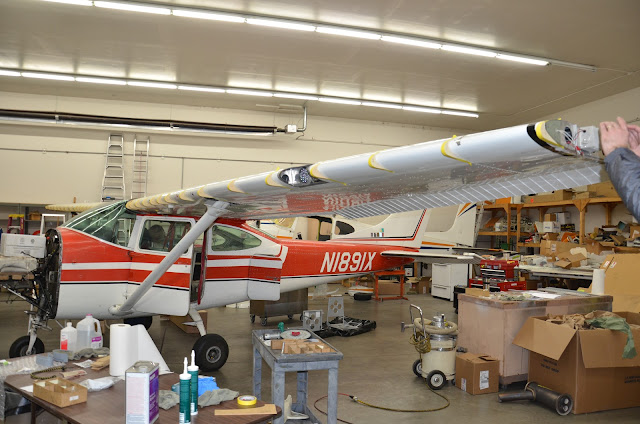91X-Ray Backcountry STOL Project Update | T-Craft Aero Club Nampa, Idaho.
Written by Tad Jones
N1891X is a 1965 Cessna 182H. I really like the classic look and details of this airplane. The small details like the emblem on the yoke, the cowl flap handle, and the "shark gill" vents in the lower cowling that give this plane its Classic character.
Aero Services in Nampa, Idaho is doing the work on the Backcountry Upgrades and are doing a great job! Jim Eyre is the Director of Maintenance at T-Craft Aero Club and keeps all our aircraft safe and in great working order. Jim has been coordinating the 91X-Ray project with Aero Services. A project like this takes a lot of time and we all appreciate the time and attention that Jim puts into our airplanes.
Idaho has an amazing backcountry airstrip system and the Cessna 182 platform is a very capable backcountry aircraft for accessing many of these airstrips. The stock Cessna 182 doesn't have as much prop clearance as its predecessor and tailwheel brethren the Cessna 180 but it does have more docile ground handling characteristics and can perform take-off and landings more easily in crosswinds and challenging wind conditions due to the location of the center of gravity being ahead of the main gear instead of behind the main gear.
If you ask most pilots which airplane looks more "Cool" they will most likely say the 180 or the 185 and I would definitely have to agree. The 182 has some distinct advantages over the 180 though. Insurance costs are more affordable. There are a lot of 182's out there so it is easier to source parts. The cabin width was increased in the 182 "E" models by nearly 4" and the subsequent models are what are often referred to as the "wide body" series. 4" may not sound like much but it really gives the pilot and passengers a lot more shoulder room than the 180's, 185's and the early model "A-D" model 182's. Cessna also introduced the "Omivision" rear window with the "E" model. This allowed more light into the cabin and the ability to see behind you while flying. This is a nice feature to be able to look at the rudder during run-up to make sure the controls are moving the rudder in the correct direction too :)
There are a ton of modifications available for the Cessna 182 to make them great performing backcountry airplanes. One of the most extreme is the Peterson King Katmai STOL kit.
Since this aircraft is being operated in a Club environment many of the recommendations for modifications have been made with the consideration that this aircraft will be flown by many different pilots with different skill levels.
- Adding larger tires for more prop clearance and for rolling over gopher holes and rough terrain at backcountry airstrips.
- Adding a new nose fork to accommodate a larger front tire.
- Wing STOL kit.
- Repairing & Rebuilding the Front Seats.
- Adding dual BAS Shoulder Harnesses.
- Replacing the Windscreen. The old windscreen had crazing in the plastic in the Pilot's line of sight. The new Windscreen would be a light grey.
- Removing the stock rear seat and replacing it with F. Atlee Dodge removable folding jump seats to easily make room for camping gear.
- Simplifying the radios and avionics & standardizing the instrument panel.
- Adding an engine monitor.
- P-Ponk "Super Eagle" Engine Conversion
P.Ponk Aviation
Work has finally begun on the 91X-Ray Backcountry Project and it is looking great so far! Here are a few photos of the project:
 |
| 91X-Ray at Aero Services |
 |
| Top and Bottom Cowling (Note the Shark Gill Vents in the Lower Cowling) Wingtips will be replaced with wingtips provided with the STOL kit. |
 |
| Don't worry...this isn't the new Engine :)...These are weights on the engine mount to keep the Tail off the Ground. |
 |
| The Area inside the Wing where the Fuel Bladder is installed is cleaned and any rough areas are taped to prevent damaging the new fuel bladder. |
Todd Hitchcock at Hitchcock Aviation was instrumental in helping us determine which nose fork to use for this project. Hitchcock Aviation
Our Club is lucky in that may of our pilots have experience flying aircraft with different STOL kits. The Sportsman STOL was recommended time and time again so that is what was decided upon.
Here is a great article on the history of the Sportsman STOL Kit






















